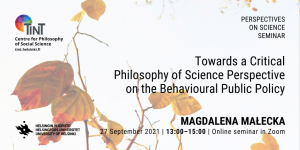
At the next Perspectives on Science seminar on Monday 27.9., Magdalena Malecka (University of Helsinki) will give a presentation titled “Towards a Critical Philosophy of Science Perspective on the Behavioural Public Policy”. The seminar takes place in Zoom from 13 to 15 pm.
Perspectives on Science is a weekly research seminar which brings together experts from science studies and philosophy of science. It is organized by TINT – Centre for Philosophy of Social Science at the University of Helsinki. More information about the seminar here.
To join the seminar, please sign up here.
Abstract:
During the talk I would like to summarize the main results of my Marie Skłodowska-Curie project which aimed at understanding how the behavioural sciences and policymaking are entangled with each other in the recent shift in public policymaking, called behavioural public policy, or the behavioral turn in policy. I argue that in the existing discussions on behavioural policy it has not been noticed so far that there is a gap between the way in which behavioural science is represented in the practices and discourses of policymaking and the knowledge that it actually provides. In order to expose this gap, I bring insights from the philosophy of science (in particular, from feminist philosophers of science) and from history of behavioural science (in particular, the history of the US behavioural research during the Cold War). I point out that the discourse of the behavioural policy, but also the debates surrounding it, including critical voices, presume a set of claims about the behavioural sciences. There seems to be a shared understanding of what the behavioural sciences offer us knowledge of. It is widely believed that behavioural research reveals irrationality of human behaviour, that it offers ‘descriptive’ and ‘realistic’ views on decision-making, that it uncovers behavioural tendencies and biases which are systematic and robust, and that it identifies cognitive causes of behavioural changes. I challenge this set of widely shared beliefs. After questioning the epistemic presumption underlying behavioural approach to policy, I reflect on what my argument means for the existing discussion. I believe, and hope, that once we have a proper understanding of what we can and cannot know on the basis of behavioural science, then new critical perspectives on the role of behavioural science in policy will open up. I end my talk by speculating about such perspectives and I present new directions I envision for my further research on this topic.
Author bio:
Magdalena Małecka is a Principal Investigator of the three-year research project in philosophy of economics at the University of Helsinki and an Assistant Professor at Aarhus University (Aarhus Institute of Advanced Studies). After defending her PhD at the Polish Academy of Sciences in Warsaw she has undertaken research at the Institute for Advanced Study in Princeton, Stanford University, Columbia University, New School for Social Research, Central European University, and European University Institute in Florence. Magdalena’s research is driven by an attempt to understand how scientific knowledge is interwoven with social, legal and political practices. She has published in the philosophy of the social and behavioural sciences, philosophy of economics, and philosophy of law.
